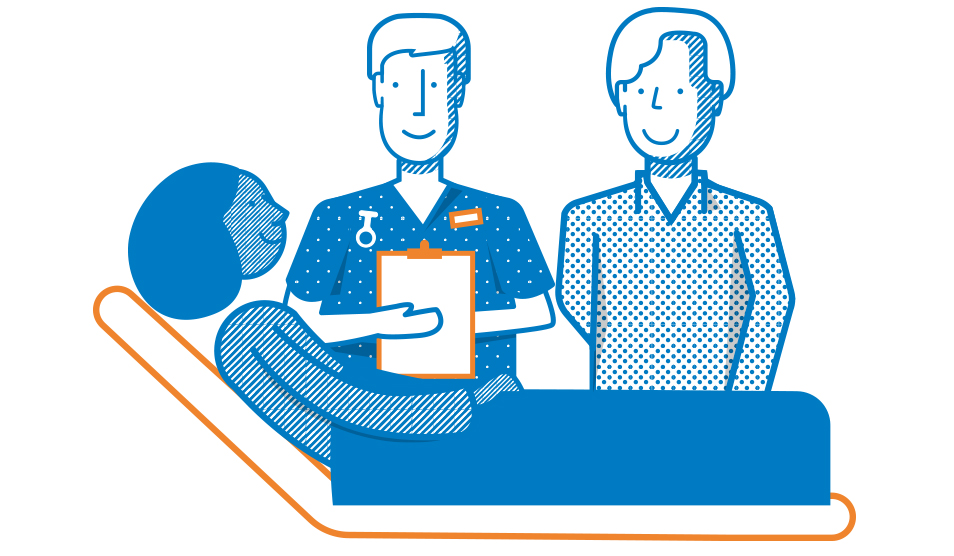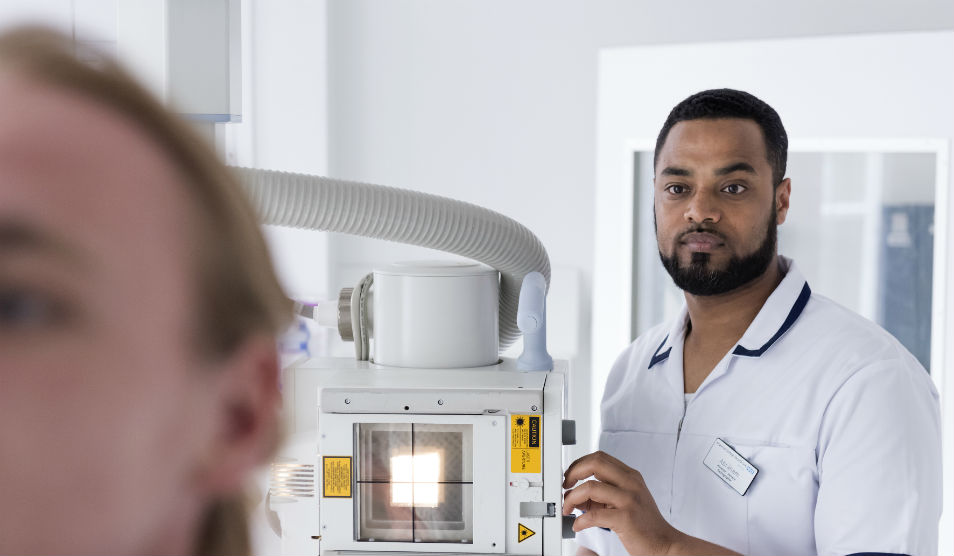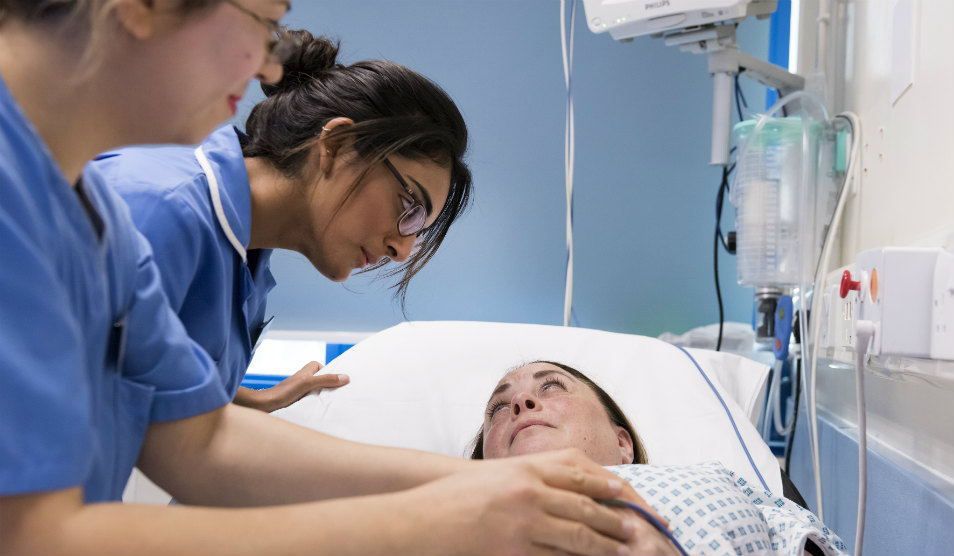Imaging
Visitor Information
Translation help:
To translate this page into your preferred language, click the Google Translate icon in the top-right menu and select your desired language.
Our imaging departments offer a comprehensive range of diagnostic and interventional procedures, supporting all aspects of clinical management at our three hospital sites and the urgent care centre at St Charles Centre for Health and Wellbeing.
We use state-of-the-art imaging equipment and the latest techniques to support our clinical teams in the diagnosis and treatment of the full range of medical problems. GP referrals, NHS patients and private patients can benefit from advanced imaging services, including angiography, fluoroscopy, computerised tomography (CT), magnetic resonance imaging (MRI), nuclear medicine, ultrasound and x-ray, supported by the radiological sciences unit (RSU).
In addition to offering extensive patient services, our imaging departments participate in a variety of high profile research programmes, working with our partners at the Academic Health Science Centre to develop healthcare innovations.
Conditions and treatments
We provide a range of tests and procedures, including:
- fluoroscopy – fluoroscopy is an imaging technique that uses x-rays to create "real-time" or moving images of the body
- angiography – a type of x-ray used to examine blood vessels
- computerised tomography (CT) – CT scans, also known as a CAT scan, uses x-rays and a computer to create detailed images of the inside of your body
- intravenous urograms (IVU) – IVU is where dye that shows up on x-ray is injected into a vein in your arm. As the kidneys filter the dye out of your blood and into your urine, the x-ray image highlights any blockages.
- interventional and endovascular procedures
- magnetic resonance imaging (MRI) – MRI is a type of scan used to diagnose health conditions that affect organs, tissue and bone. MRI scanners use strong magnetic fields and radio waves to produce detailed images of the inside of the body.
- nuclear medicine – nuclear medicine involves the use of a small amount of a radioactive tracer to help get pictures from inside the body
- positron emission tomography (PET) – PET is used to produce a detailed, three-dimensional picture of the inside of the body
- ultrasound – ultrasound uses high frequency sound waves to create an image of part of the inside of the body, such as muscles, tendons, and many internal organs. It is also used during pregnancy to produce images of unborn babies
- radioisotope studies – radioisotope studies use a small amount of radioactivity to produce pictures on a special camera
- bone density measurements – dual energy x-ray absorptiometry (DEXA) is used to measure the density of bones
- x-ray – a safe and painless procedure often used to produce images of the inside of the body such as fractured bones and to examine organs
Clinics
Imaging clinic at Charing Cross Hospital
Address
Imaging department
First floor, north wing
Charing Cross Hospital
Fulham Palace Road
London W6 8RF
Hours
08.30 to 16.30, Monday through Friday.
Contact information
Phone: 020 3313 0077
Imaging clinic at Hammersmith Hospital
Address
Imaging department
First floor, A block
Hammersmith Hospital
Du Cane Road
London W12 0HS
Hours
08.30 to 16.30, Monday through Friday.
Contact information
Phone: 020 3313 0077
Imaging clinic at St Mary’s Hospital
Address
Imaging department
Third floor
Queen Elizabeth Queen Mother (QEQM) building
St Mary’s Hospital
Praed Street
London W2 1NY
Hours
08.30 to 16.30, Monday through Friday.
Contact information
Phone: 020 3312 6418
Imaging clinic at St Charles Centre for Health and Wellbeing
Address
Imaging department
Ground floor
St Charles Centre for Health and Wellbeing
Exmoor Street
London W10 6DZ
Hours
09.00 to 19.30, Monday through Friday, and 10.30 to 19.30 on weekends.
Contact information
Phone: 020 3312 4212
Additional information
If you have an appointment at St Mary’s Hospital for an MRI, please note that MRIs are performed in the basement of the Cambridge/Clarence Memorial Wing. There is an additional gynaecology ultrasound department in the Winston Churchill Wing.
Meet the team
Consultant radiologists
Dr Amrish Mehta, clinical director, imaging
Dr Afshin Alavi
Dr Dimitri Amiras
Dr Ben Ariff
Dr Syed Babar
Dr Nigel Barrett
Professor Tara Barwick
Dr Nishat Bharwani
Dr Kunwar Bhatia
Dr Dominic Blunt
Dr Martin Clark
Dr Stella Comitis
Professor Susan Copley
Dr Mary Crofton
Dr Deborah Cunningham
Dr Joanna Danin
Professor Elizabeth Dick
Professor Wladyslaw Gedroyc
Professor Philip Gishen
Dr Deepa Gopalan
Dr Chris Harvey
Professor Anne Hemingway
Dr Sameer Khan
Dr Monica Khanna
Professor Adrian Lim
Dr Gitta Madani
Dr Declan O’Regan
Dr Mark Paley
Dr Marc Pelling, interventional radiologist
Dr Hema Purushothaman
Professor Andrea Rockall
Dr Mary Roddie
Dr Christopher Schelvan
Dr Mayai Seah
Dr Tran Seaton
Dr Sarah Sheard
Dr Victoria Stewart
Dr Henry Tam, substantive consultant
Dr Katherine VanRee
Dr Neelofer Zaman
Dr Neil Upadhyay
Dr Amanda (Miny) Walker
Dr Zarni Win
Dr Andrew Wright
Consultant interventional radiologists
Dr Yassir Al-Radhi
Dr Ali Alsafi
Dr Ondina Bernstein
Dr Nicholas Burfitt
Dr Alison Graham
Professor Mohamad Hamady
Dr James Jackson
Dr Elika Kashef
Dr Nadeem Qazi
Dr Sammy Rostampour
Dr Dylan Roi
Dr Robert Thomas
Consultant neuroradiologists
Dr Farah Alobeidi
Dr Brynmor Jones
Dr Olga Kirmi
Professor Kyriakos Lobotesis
Dr Amrish Mehta
Dr Maneesh Patel
Dr Neil Rane
Dr Abhinav Singh
Patient information
Before your appointment
We aim to provide our patients with an appointment date within a week of receiving the referral form. You are welcome to bring a relative, close friend or carer with you to your appointment, but it may not be possible for that person to be present while the test is being performed. Your companion is welcome to wait in our designated waiting area.
Prior to your appointment, we will give you instructions about any special preparations that are required, as well as a leaflet that will help you understand what your specific test will show and what you can expect while the test is being performed. Be sure to bring your appointment letter, and if you are attending for an x-ray, please bring your original request form.
During your appointment
Please note that we are a teaching hospital, so medical students may be present for some appointments. If you are not comfortable with this, please let your radiographer know.
When you arrive, please check in at reception. You may be asked to complete a safety questionnaire. You will be asked to confirm your name, date of birth and address, and then you will be asked to change into a gown. You will then remain in the changing cubicle until you are called through to the x-ray/scanning area. The radiographer performing the scan or x-ray will ask you to position yourself in certain ways in order to obtain optimal imaging for review.
After your appointment
The results of all examinations are made available to the referring team as soon as our consultants have reviewed the imaging taken and issued a report. The referring team could include your GP or the clinical team looking after you at our Trust or external organisations.
Patient information leaflets
- Arranging your hysterosalpingogram HSG
- Bone densitometry DEXA scan
- Cerebral aneurysm
- Ethanol ablation (EA) for the treatment of thyroid nodules
- Having an angiogram
- Having a CT scan
- Having a CT scan (easy read)
- Having a gynae pelvis MRI scan
- Having a gynaecological pelvic and transvaginal ultrasound scan
- Having a liver, adrenal or pancreas MRI scan
- Having microwave ablation of a renal kidney tumour
- Having a microwave ablation of liver tumours
- Having an MRI scan (easy read)
- Having a musculoskeletal ultrasound scan and injection
- Having a percutaneous nephrostomy
- Having a percutaneous transhepatic cholangiogram (PTC)
- Having an MRCP
- Having an MRI scan
- Having an MRI small bowel scan
- Having an ultrasound scan
- Having an ultrasound guided muscle biopsy
- Having an x-ray (easy read)
- Mechanical thrombectomy for acute ischaemic stroke
- PortaCath discharge information
- Radiologically Inserted Gastrostomy
- Sentinel lymph node injection and scan
Refer to this service
GP
GPs can refer patients using the electronic request form, which is available via NHS e-Referrals, and can be sent via email.
Hammersmith Hospital
Email: imperial.imaging-apt-hh@nhs.net
Charing Cross Hospital
Email: ICHC-tr.imagingreferralscxh@nhs.net
St Mary’s Hospital
Email: imperial.imagingreferrals@nhs.net
GP advice
If GPs require advice from a consultant radiologist before referring patients for an examination, please contact us via email.
Email: radiologyadvice.imperial@nhs.net
Phones at Charing Cross, Hammersmith and St Mary’s hospitals are answered from 08.30 to 17.00, Monday through Friday.
Phone (Charing Cross and Hammersmith hospitals): 020 3313 0077
Phone (St Mary’s Hospital): 020 3312 6418
Secondary care
We welcome referrals from other trusts. We accept referrals in the form of a letter on the organisation's letterhead paper. The letter must contain the patient's details, i.e. date of birth, NHS number, address and a clinical history. External referrals must be emailed to our reception team as follows:
Hammersmith Hospital
Email: imperial.imaging-apt-hh@nhs.net
Charing Cross Hospital
Email: ICHC-tr.imagingreferralscxh@nhs.net
St Mary’s Hospital
Email: imperial.imagingreferrals@nhs.net
Additional information
Imperial College Healthcare Private Care
We also offer private care services at Imperial College Healthcare.
All funds generated by our private care services are reinvested back into the Trust, supporting the development of both NHS and private care for the benefit of all our patients.
Find more information about private diagnostic tests and imaging services on our private care website.
Clinical trials and research
The imaging research team is primarily based at Charing Cross Hospital, but provides advice and support for new studies at all three Imperial College Healthcare NHS Trust sites. This includes assistance with the administrative requirements needed for local approval and Imaging Research Committee (IRC) review, guidance with the imaging component of ethics applications, advice on research governance (ARSAC and IR(ME)R), and the provision of appropriate research tariffs.
The imaging department are currently involved in a number of studies. If you are interested in participating in a research study please speak to the doctor in your area or email liam.greenshields@nhs.net or lesley.honeyfield@nhs.net who may be able to provide you with more information.
Education and elective placements
We offer short-term elective placements for current diagnostic radiography students. If you are currently a student in a diagnostic radiography programme, you may contact one of our student co-ordinators for more information.
- Hammersmith Hospital - imperial.studentsimaging.hh@nhs.net
- Charing Cross Hospital - imperial.cxh.radstudents@nhs.net
- St Mary's Hospital - imperial.smh.rad.students@nhs.net
Take our friends and family test Learn more
Would you recommend our services to your friends and family? Let us know by completing our friends and family test. Your comments will help us to make changes and take immediate action when there’s a problem.



